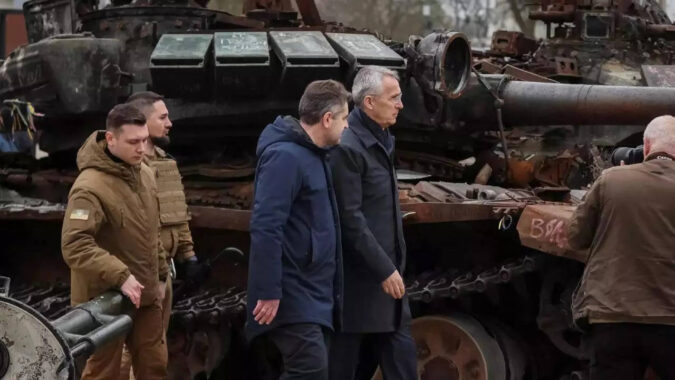BRUSSELS: Nato Secretary General Jens Stoltenberg on Wednesday said the members of the Western military alliance are divided on what to do at an upcoming summit about Ukraine‘s push to join.
“On that issue there are different views in the alliance and of course the only way to make decisions in Nato is by consensus,” Stoltenberg told a conference in Brussels.
Ukraine — backed by Nato countries in eastern Europe — is calling for a “clear message” at a July summit of alliance leaders in Lithuania’s capital Vilnius that it will join after Russia’s war ends.
Kyiv concedes it will not become a member while fighting rages on its territory. But it wants the alliance to move beyond a vague 2008 pledge that it will one day be in Nato.
“No one is able to tell you exactly what will be the final decision at the Vilnius summit on this issue,” Stoltenberg said.
Diplomats from Nato countries say its dominant military power, the United States, is reluctant to go further than the vow on membership made to Ukraine 15 years ago.
Joining Nato would mean that Ukraine would be covered by the alliance’s Article 5 collective defence clause that obliges all allies to help defend it if attacked.
Ukraine’s Western allies are mulling if other forms of security assurances can be offered to Ukraine that would reassure Kyiv as an interim step before it became a Nato member.
France on Tuesday said it is willing to reach a deal with Ukraine on “security guarantees which will help it to defend itself in the long-term”.
“The ultimate security guarantee will be Nato membership, but … that’s not something that will happen in the midst of a war,” Stoltenberg said.
“The question is, what will we decide on and how will we address the issue of membership at the Vilnius summit? And as I said, it’s too early to say.”
Stoltenberg said that when the war in Ukraine ends “we need to make sure that we have arrangements in place to deter further Russian aggression”.
“That is partly by providing military support to Ukraine to help them deter, and defend themselves,” he said.
“But that will also then open the discussions about different kinds of security arrangements.”
Stoltenberg said he expected Nato leaders at least to agree at the summit to a multi-year programme to help switch Ukraine’s military to using Western hardware.
Russia’s war has already spurred Ukraine to turn to NATO-standard weaponry as its international backers have funnelled increasingly advanced weaponry to Kyiv.
“On that issue there are different views in the alliance and of course the only way to make decisions in Nato is by consensus,” Stoltenberg told a conference in Brussels.
Ukraine — backed by Nato countries in eastern Europe — is calling for a “clear message” at a July summit of alliance leaders in Lithuania’s capital Vilnius that it will join after Russia’s war ends.
Kyiv concedes it will not become a member while fighting rages on its territory. But it wants the alliance to move beyond a vague 2008 pledge that it will one day be in Nato.
“No one is able to tell you exactly what will be the final decision at the Vilnius summit on this issue,” Stoltenberg said.
Diplomats from Nato countries say its dominant military power, the United States, is reluctant to go further than the vow on membership made to Ukraine 15 years ago.
Joining Nato would mean that Ukraine would be covered by the alliance’s Article 5 collective defence clause that obliges all allies to help defend it if attacked.
Ukraine’s Western allies are mulling if other forms of security assurances can be offered to Ukraine that would reassure Kyiv as an interim step before it became a Nato member.
France on Tuesday said it is willing to reach a deal with Ukraine on “security guarantees which will help it to defend itself in the long-term”.
“The ultimate security guarantee will be Nato membership, but … that’s not something that will happen in the midst of a war,” Stoltenberg said.
“The question is, what will we decide on and how will we address the issue of membership at the Vilnius summit? And as I said, it’s too early to say.”
Stoltenberg said that when the war in Ukraine ends “we need to make sure that we have arrangements in place to deter further Russian aggression”.
“That is partly by providing military support to Ukraine to help them deter, and defend themselves,” he said.
“But that will also then open the discussions about different kinds of security arrangements.”
Stoltenberg said he expected Nato leaders at least to agree at the summit to a multi-year programme to help switch Ukraine’s military to using Western hardware.
Russia’s war has already spurred Ukraine to turn to NATO-standard weaponry as its international backers have funnelled increasingly advanced weaponry to Kyiv.
